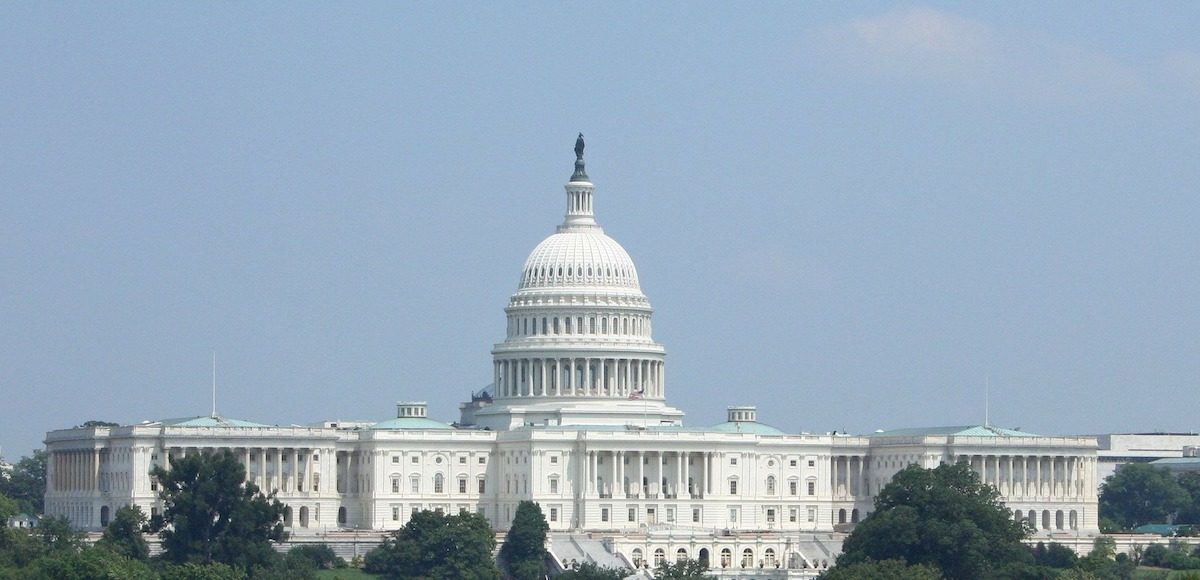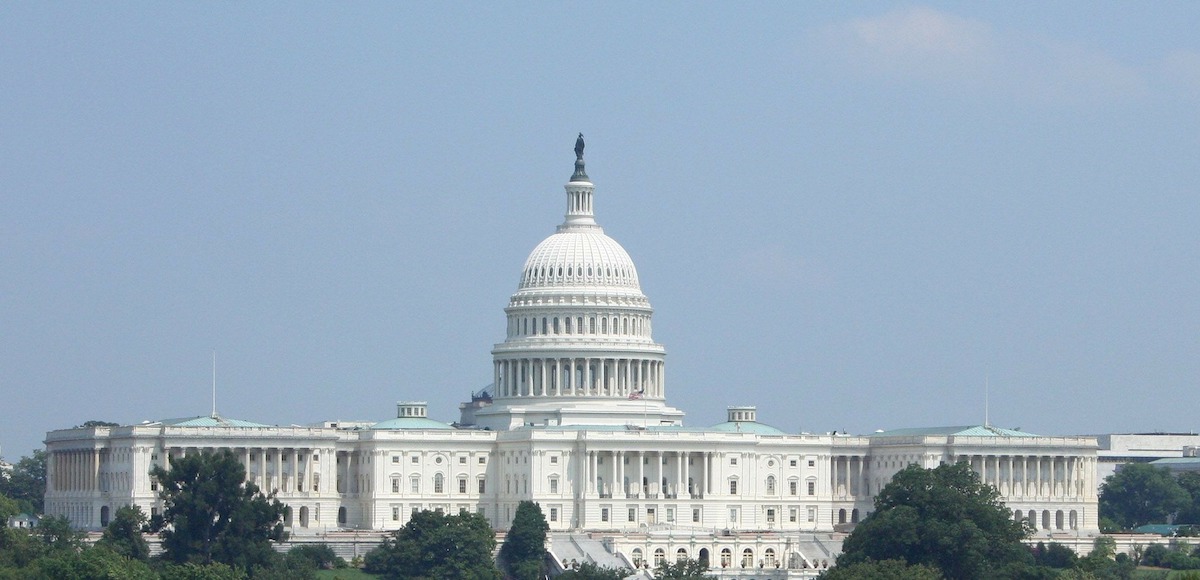

U.S. Capitol Building in Washington, DC. (Photo: People’s Pundit Daily/Pixabay)
Beginning in the 1980s, money-laundering laws were enacted in hopes of discouraging criminal activity by making it harder for crooks to use the banking system. Unfortunately, this approach has been an expensive failure.
- They don’t reduce crime or discourage bad behavior.
- They require banks to spy on innocent people and report their transactions.
- They impose heavy costs on the financial sector and boost prices for consumers.
- They disproportionately hurt poor people and poor countries.
Amazingly, some politicians actually want to make these laws even worse. I wrote last year about some intrusive, expensive, and pointless legislation proposed by Senators Grassley, Feinstein, Cornyn, and Whitehouse.
Now there’s another equally misguided set of proposals from Senators Rubio and Wyden, along with Representatives Pearce, Luetkemeyer, and Maloney. They want to require complicated and needless ownership data from millions of small businesses and organizations.
David Burton of the Heritage Foundation has a comprehensive report on the legislation. Here’s some of what he wrote.
Congress is seriously considering imposing a beneficial ownership reporting regime on American businesses and other entities, including charities and churches. …the House and Senate bills…share three salient characteristics. First, they would impose a large compliance burden on the private sector, primarily on small businesses, charities, and religious organizations. Second, they create hundreds of thousands—potentially more than one million—inadvertent felons out of otherwise law-abiding citizens. Third, they do virtually nothing to achieve their stated aim of protecting society from terrorism or other forms of illicit finance. …Furthermore, the creation of this expensive and socially damaging reporting edifice is unnecessary. The vast majority of the information that the proposed beneficial ownership reporting regime would obtain is already provided to the Internal Revenue Service.
Richard Rahn criticizes this new proposal in his weekly column.
…what would you think of a member of Congress who proposes to put a new regulation on the smallest of businesses that does not meet a cost-benefit test, denies basic privacy protections and, because of its vagueness and ambiguity, is likely to cause very high numbers of otherwise law-abiding Americans to be felons? …Some bureaucrats and elected officials argue that the government needs to know who the “beneficial owners” are of even the tiniest of businesses in order to combat “money-laundering,” tax evasion or terrorism. …Should the church ladies who run the local non-profit food bank be put in jail for their failure to submit the form to the Feds that would give them the exemption from the beneficial ownership requirement? …Given how few people are actually convicted of money-laundering, the overwhelming evidence is that 99 percent of the people being forced to submit to these costly and time-consuming proposed regulations will not be guilty of money-laundering, terrorism or whatever, and thus should not be harassed by government.
Writing for the Hill, J.W. Verret, an expert in business law from George Mason University Law School, highlights some of the serious problems with this new regulatory scheme.
Legislation under consideration in Congress, the Counter Terrorism and Illicit Finance Act, risks tying entrepreneurs’ hands with even more red tape. In fact, it could destroy any benefit some small businesses stand to gain from the tax reform legislation passed last year. It would require corporations and limited liability companies with fewer than 20 employees to file a form with the Treasury Department at the time of formation, and update it annually, listing the names of all beneficial owners and individuals exercising control. …Given the substantial penalties, this will impose a massive regulatory tax on small businesses as they spend money on lawyers that should go toward workers’ pay. …It is unlikely someone on a terrorist watch list would provide their real name on the required form, and Treasury will probably never have sufficient resources to audit names in real time.
Professor Verret explains some of the practical problems and tradeoffs with these proposals.
…some individual money laundering investigations would be easier with a small business registry available. But IRS tax fraud investigations would be much easier with access to taxpayers’ bank account login information — would we tolerate the associated costs and privacy violations? …How is the term “beneficial owner” defined? How is “control” defined? As a professor of corporate law, I have given multiple lectures on those very questions. What if your company is owned, in part, by another company? Or there is a chain of ownership through multiple intermediary companies? What if a creditor of the company, though not currently a shareholder or beneficial owner, obtains the contractual right to convert their debt contract into ownership equity at some point in the future? …for the average small business owner, navigating those complexities against the backdrop of a potential three year prison sentence will often require legal counsel. Companies affected by this legislation should conservatively expect to spend at least $5,000 on a corporate lawyer to help navigate the complexities of the new filing requirements.
Needless to say, squandering $5,000 or more for some useless paperwork is not a recipe for more entrepreneurship.
So how do advocates for this type of legislation respond?
Clay Fuller of the American Enterprise Institute wants us to have faith that bad people will freely divulge their real identities and that bureaucrats will make effective use of the information.
It is time to weed out illicit financing and unfair competition from criminals and bad actors. …Passing the House Financial Services Committee’s Counter Terrorism and Illicit Finance Act should be a priority for the 115th Congress. …Dictators, terrorists and criminals have been freeriding on the prosperity and liberty of the American economy for too long. Officials at FinCEN are sure that beneficial ownership legislation will exponentially increase conviction rates. We should give law enforcement what they need to do their jobs.
Gee, all that sounds persuasive. I’m also against dictators, terrorists, and criminals.
But if you read his entire column, you’ll notice that he offers zero evidence that this costly new legislation actually would catch more bad guys.
And since we already know that anti-money laundering laws impose heavy costs and catch almost no bad guys, wouldn’t it be smart to figure out better ways of allocating law enforcement resources?
I don’t know if we should be distressed or comforted, but other parts of the world also are hamstringing their financial industries with similar policies.
Here’s some analysis from Europe.
…a new reportfrom Consult Hyperion, commissioned by Mitek, reveals that the average UK bank is currently wasting £5 million each year due to manual and inefficient Know Your Customer (KYC) processes, and this annual waste is expected to rise to £10 million in three years. …Key Findings…Inefficient KYC processes cost the average bank £47 million a year…Total costs for KYC processes range from £10 to £100 per check…In the UK, 25% of applications are abandoned due to KYC friction… The cost of KYC checks is much too high, placing too much reliance on inefficient and error-prone manual processes,” said Steve Pannifer, author of the report and COO at Consult Hyperion.
And here’s an update from Asia.
Anti-money laundering and know-your-customer compliance have become leading concerns at financial institutions in Asia today. … we estimate that AML compliance budgets across the six Asian markets in this study total an estimated US$1.5 billion annually for banks alone. …A majority of respondents (55%) indicated that AML compliance has a negative impact on their firms’ business productivity. …An additional 15% felt that AML compliance actually threatens their firms’ ability to do business. …Eighty-two per cent of survey respondents saw overall AML compliance costs increasing in 2016, with one third projecting that costs will rise by 20% or more.
The bottom line is that laws and regulations dealing with money laundering are introduced with high hopes of reducing crime.
And when there’s no effect on criminal activity, proponents urge ever-increasing levels of red tape. And when that doesn’t work, they propose new levels of regulation. And still nothing changes.
Lather, rinse, repeat.
Here’s the video I narrated on this topic. It’s now a bit dated, but everything I said is even more true today.
Let’s close with a surreal column in the Washington Post from Dana Milbank. He was victimized by silly anti-money laundering policies, but seems to approve.
I did not expect that my wife and I would be flagged as possible financiers of international terrorism. …The teller told me my account had been blocked. My wife went to an ATM to take out $200. Denied. Soon I discovered that checks I had written to the au pair and my daughter’s volleyball instructor had bounced. …I began making calls to the bank and eventually got an explanation: The bank was looking into whether my wife and I were laundering money, as they are required to by the Bank Secrecy Act as amended by the Patriot Act. …the bank seemed particularly suspicious that my wife was the terrorist… The bank needed answers. Did she work for the government? How much money does she make? Is she a government contractor? …a week later they came back with a new threat to freeze the account and a more peculiar question: Is my wife politically influential?
Sounds like an awful example of a bank being forced by bad laws to harass a customer.
Heck, it is an awful example of that happening.
But in a remarkable display of left-wing masochism, Milbank approves.
The people who flagged us were right to do so. …Citibank, though perhaps clumsy, was doing what it should be doing. “Know your customer” regulations are important because they prevent organized-crime networks, terrorists and assorted bad guys from moving money. Banking regulations generally are a hassle, and expensive. But they protect us — not just from terrorists such as my wife and me but from financial institutions that would otherwise exploit their customers and jeopardize economic stability the way they did before the 2008 crash.
I guess we know which way Milbank would have responded to this poll question from 2013.

But he would be wrong because money-laundering laws don’t stop terrorism.
We’re giving up freedom and imposing high costs on our economy, yet we’re not getting any additional security in exchange.
And I can’t resist commenting on his absurd assertion that money laundering played a role in the 2008 crash. Does he think that mafia kingpins somehow controlled the Federal Reserve and insisted on easy-money policies and artificially low interest rates? Does he think ISIS operatives were somehow responsible for reckless Fannie Mae and Freddie Mac subsidies?
Wow, I thought the people who blamed “tax havens” for the financial crisis deserved the prize for silliest fantasies. But Milbank gives them a run for their money.




